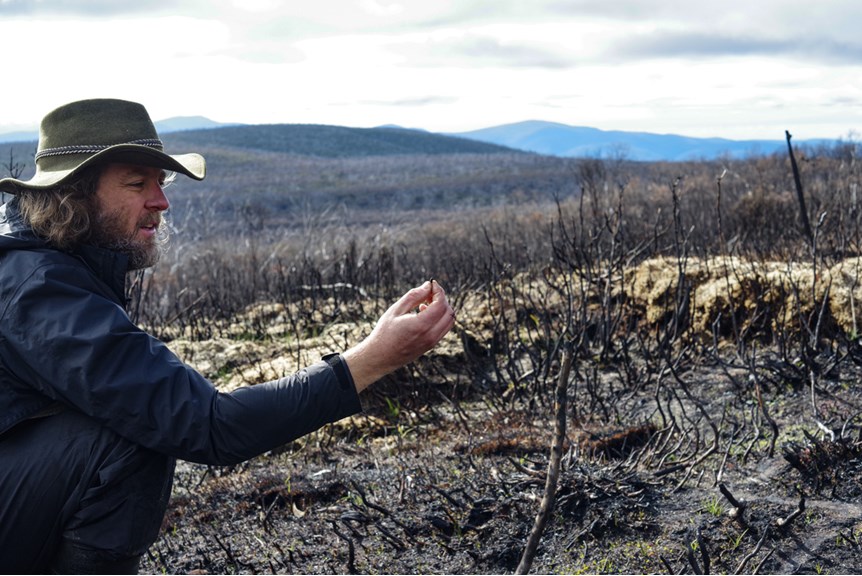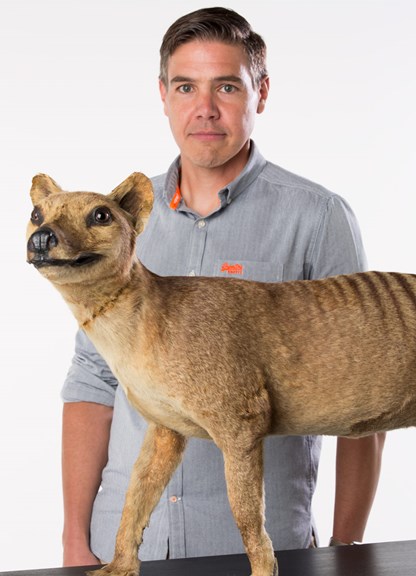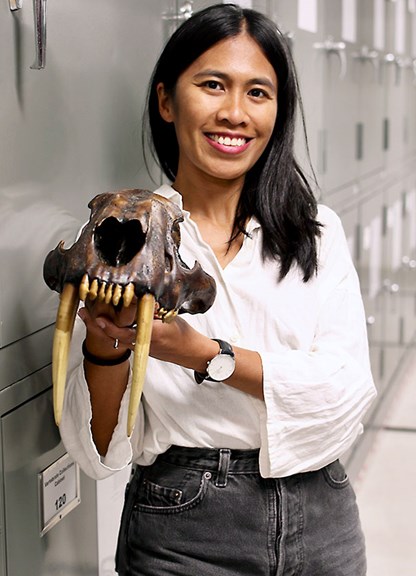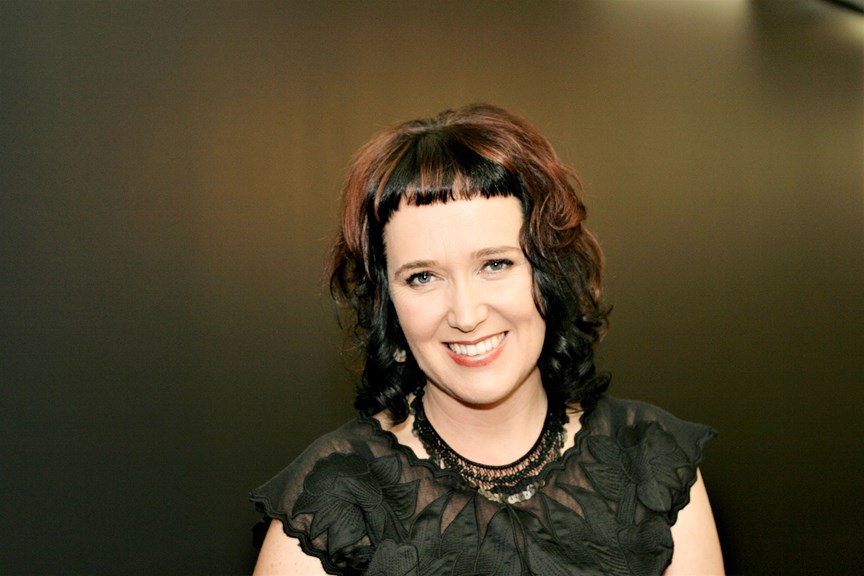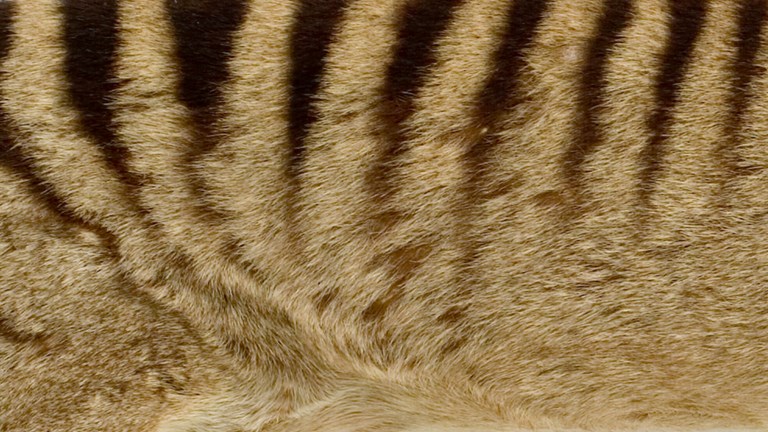
Reversing Extinction
Extinct species were until recently considered gone forever. Yet recent breakthroughs suggest that reviving extinct animals could soon become a reality.
Humanity is triggering extinctions at rates not seen since the Earth’s largest mass extinction event 66 million years ago. But what if we could reverse this?
De-extinction is the process of using new developments in DNA sequencing and genetic engineering to resurrect extinct animals. This promising new tool in conservation biology is being met with optimism and concern.
ABC broadcaster and presenter of Science Friction, Natasha Mitchell leads a conversation with members the Melbourne team leading a ground-breaking de-extinction project to bring the Tasmanian tiger back from the dead and an international guest speaker working at the intersection of palaeontology and modern ecology. Hear how skins and skeletons, long preserved in museum collections are offering new scientific grounds for returning species like the woolly mammoth, the passenger pigeon, and the Thylacine to their natural habitats. Featuring Museum's Victoria’s Kevin Rowe, Senior Curator of Mammals, Andrew Pask, Professor of Genetics, University of Melbourne and Mairin Balisi, Curator of Paleontology, The Raymond M. Alf Museum of Paleontology, California, joining live via video link.
Speakers
Dr Kevin Rowe
Senior Curator of Mammals, Museums Victoria
Dr Kevin Rowe has been Senior Curator of Mammals at Museums Victoria since 2011 and is an Honorary Fellow in Biosciences at the University of Melbourne where he supervises post-graduate students.
His research integrates fieldwork, genetics, and museum specimens to address a wide range of questions related to the taxonomy, evolution, ecology, and conservation of mammals, particularly rodents. He has numerous active field programs in Australia and Indonesia where his research has led to the discovery and description of six species of mammals with several new species still to describe.
He was born in California and studied psychology and neurobiology at the University of California, Berkeley. In 2005 he completed a PhD in Biology at the University of Illinois and from 2005 to 2007 he held post-doctoral positions at Florida State University and Southern Cross University where he studied the systematics and evolution of Australian rodents. From 2007-2011 he was a post-doctoral fellow at the Museum of Vertebrate Zoology at the University of California, Berkeley where he worked on rodent systematics and used the rich historical record at MVZ and modern resurveys of mammals to test responses of species to climate change over the last century.
Prof Andrew Pask
Professor In Epigenetics, Biosciences, University of Melbourne
Dr Andrew Pask is a Professor in the School of BioSciences at the University of Melbourne. His research focuses on Evolution and Development (Evo-Devo) and Reproduction, using marsupial, mouse and human models in his research.
His lab sequenced the genome of the extinct thylacine and is using this data to understand more about the biology of this unique marsupial predator.
The recently established TIGRR lab is also developing methods to examine the possibility of de-extinction for this species as well as tools to help preserve and conserve current threatened and endangered marsupial species.
Dr Mairin Balisi (joining live via video link)
Augustyn Family Curator, Raymond M. Alf Museum of Palaeontology, Claremont, California, United States
Dr Mairin Balisi is a museum curator and palaeontologist specialising in the ecology, evolution, and behaviour of extinct North American mammals, particularly carnivorans: cats, dogs, and relatives.
She studied integrative biology and comparative literature at the University of California, Berkeley, earning a M.S. (University of Michigan) and Ph.D. (University of California, Los Angeles) in ecology and evolutionary biology and has recently completed appointments as a Chancellor's Postdoctoral Fellow at the University of California, Merced, and as a National Science Foundation Postdoctoral Research Fellow at the La Brea Tar Pits & Museum in Los Angeles, California.
While much of her previous research has focused on extinct charismatic megafauna like the saber-tooth cat and dire wolf, she is currently working at the intersection of palaeontology and modern ecology, investigating how environmental change and megafaunal extinctions at the end of the last Ice Age impacted surviving species, and how this period of transition could guide us through ongoing global change.
Moderator
Natasha Mitchell
Science Journalist and Presenter, Science Friction, ABC Radio National (RN)
Natasha Mitchell is a multi-award-winning science journalist, host, audio producer and podcaster. She is the presenter and producer of the weekly culture and science show, Science Friction (winner of Best Science and Medicine Podcast at the 2019 Australian Podcast Awards). She hosted the flagship daily social affairs program Life Matters on ABC Radio National for 4 years and founded the internationally acclaimed program and podcast All in the Mind which she hosted and produced for a decade.
Natasha served as vice president of the World Federation of Science Journalists, was recipient of the prestigious MIT Knight Journalism Fellowship, the New York Radio Festivals’ Grand Prize and four Gold World Medals, amongst other awards. She was co-editor of the 2013 Best Australian Science Writing anthology.
She has an engineering degree from Monash University, and a postgraduate diploma in science communication from the Australian National University. She regularly facilitates public events and dialogues around Australia, including a series of four dialogues with the Dalai Lama and leading scientists.
